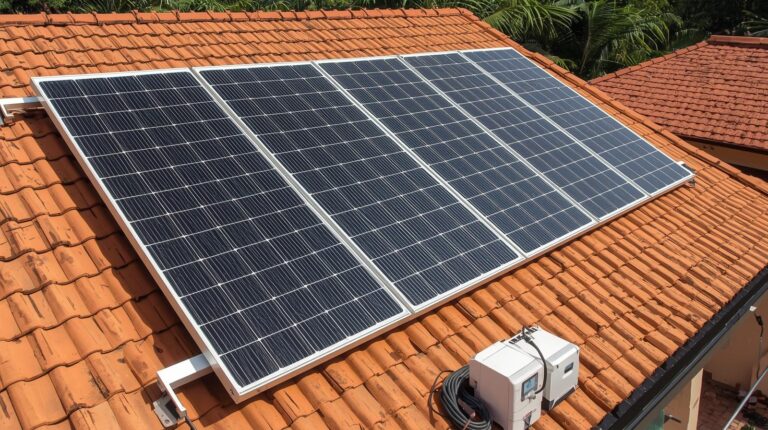When exploring cost-effective solar battery storage options, it is essential to assess various factors to optimize efficiency and savings. From golf cart batteries to specialized solar battery systems, the market offers a range of choices. However, understanding how these options align with specific energy needs, storage capacities, and long-term benefits can make a significant difference in the overall cost-effectiveness of the investment.
By exploring the intricacies of these solar battery solutions, individuals and businesses can make informed decisions that not only save money but also contribute to a sustainable energy future.
Key Takeaways
- Consider golf cart or deep-cycle batteries for affordable solar storage.
- Research Crown, Trojan, or dedicated solar batteries for cost-effective options.
- Factor in the number of batteries, capacity, and energy needs for savings.
- Evaluate installation costs, efficiency metrics, and warranty details for cost-effectiveness.
- Explore federal tax credits, state programs, and utility incentives to reduce solar battery expenses.
Affordable Solar Battery Options
When considering affordable solar battery options, golf cart batteries stand out as a cost-effective choice due to their reliability and durability. These deep-cycle batteries are specifically designed for continual deep discharge, making them ideal for efficient energy storage in solar applications.
Crown Batteries, offering a lifetime cost of $0.17 per 100Ah with 1200 cycles at 50% depth of discharge, provide a budget-friendly solution for solar storage needs. Similarly, Trojan T-105RE batteries, priced at $0.18 per 100Ah and offering 1700 cycles at 50% DoD, present another economical option for solar energy storage.
Dedicated solar batteries are known for their long-lasting performance and are tailored to provide a cost-effective solution for storing solar energy efficiently. By focusing on deep-cycle batteries like golf cart batteries, users can benefit from reliable, durable, and budget-friendly storage solutions that guarantee the longevity and effectiveness of their solar energy systems.
Factors Impacting Battery Installation Costs
Considering the complex nature of solar battery systems, understanding the factors that influence installation costs is crucial for making informed decisions regarding the implementation of a cost-efficient and effective energy storage solution.
The number of batteries installed directly impacts the total cost of a solar battery system, with variables like energy needs, storage capacity, backup duration, and appliance usage playing essential roles in determining installation expenses.
Additionally, the choice of battery brand can significantly impact the pricing of a solar battery setup, as different brands offer varying costs and performance levels that affect overall installation costs. Advanced features such as integrated inverters can also elevate the total cost of installation due to the added functionalities they bring to the system.
Battery Functionality and Benefits
Solar batteries play an essential role in storing excess electricity generated by solar panels for later use, offering various benefits and functionalities to enhance energy efficiency and independence. Solar batteries provide backup power, reducing reliance on the power grid and lowering electricity costs.
By storing energy, solar batteries help offset high electricity prices during peak demand hours, contributing to energy independence. This stored energy can be used during outages, ensuring uninterrupted power supply and enhancing self-consumption of solar energy.
Additionally, solar batteries contribute to a smaller carbon footprint, promoting sustainability. Investing in the best solar batteries and a well-designed solar battery system can lead to a significant return on investment by maximizing energy usage and reducing reliance on external sources.
The table below highlights key benefits of solar batteries in enhancing energy efficiency and reducing electricity costs:
| Benefits | Functionality | Solar Batteries |
|---|---|---|
| Backup Power | Stored Energy | Energy Independence |
| Lower Electricity Costs | Return on Investment | Self-Consumption |
Performance Factors to Consider
When evaluating solar battery options, it is important to take into account efficiency metrics, lifespan, and maintenance requirements to guarantee peak performance. Efficiency metrics comparison provides valuable insights into how efficiently a solar battery can store and discharge energy. Lifespan and maintenance considerations play a significant role in determining the overall durability and cost-effectiveness of the solar battery system.
Efficiency Metrics Comparison
Efficiency metrics serve as vital indicators when evaluating the performance factors of solar battery storage options. Key metrics to ponder include round-trip efficiency, which reflects the energy storage efficiency of a solar battery system. Depth of discharge is another crucial factor as it determines the safe energy usage levels of the battery, impacting its longevity.
Power output is essential, with variations in peak and continuous power ratings among different solar batteries. Additionally, warranty details play a significant role in safeguarding the investment made in a solar battery system, encompassing aspects like duration and coverage.
Lifespan and Maintenance
Taking into account the lifespan and maintenance requirements of solar battery storage systems is significant for ensuring their best performance and longevity. Proper maintenance plays a pivotal role in maximizing the efficiency and lifespan of solar batteries.
Here are key points to keep in mind:
- Regular Monitoring: Monitoring the depth of discharge levels is essential to prevent excessive strain on the batteries and prolong their lifespan.
- Temperature Control: Maintaining proper temperature control is crucial as extreme temperatures can affect the battery’s performance and longevity.
- Charging Rates: Ensuring that the batteries are charged at the recommended rates helps prevent overcharging, which can lead to premature degradation.
- Professional Installation: Proper installation by trained professionals is essential for optimizing the performance and lifespan of solar batteries.
Environmental Impact and Popular Brands
Solar batteries play an essential role in reducing carbon emissions and promoting sustainable energy practices. As consumers consider investing in solar battery storage options, it is important to evaluate both the environmental benefits and the reputation of popular brands in the market.
Environmental Benefits
Leading solar battery brands like Tesla Powerwall, LG Chem RESU, and Sonnen eco are at the forefront of providing environmentally sustainable energy storage solutions. When it comes to environmental benefits, solar batteries play a vital role in reducing reliance on fossil fuels, lowering carbon emissions, and promoting overall environmental sustainability.
Here are some key points to keep in mind:
- Proper disposal and recycling programs for solar batteries guarantee minimal environmental impact.
- Popular brands such as Tesla Powerwall, LG Chem RESU, and Sonnen eco are leading the way in offering effective energy storage systems.
- The average cost of solar batteries ranges from $5,000 to $15,000, offering long-term savings and contributing to environmental benefits.
- Choosing reputable brands with efficient energy storage systems can maximize the environmental benefits and long-term savings associated with solar battery usage.
Brand Recommendations
In the area of solar battery storage options, a significant aspect to ponder is the environmental impact and popularity of various brands in the industry. Tesla Powerwall, LG Chem RESU, and Sonnen Eco are among the well-known solar battery brands that offer environmentally friendly options.
These brands not only help reduce carbon emissions but also provide reliable and efficient energy storage solutions, aiding in lowering energy bills and increasing energy independence.
Additionally, BYD Battery Box HVL and Enphase Encharge are reputable brands in the solar battery industry, catering to a variety of energy storage needs.
The average cost of these solar batteries typically falls between $5,000 to $15,000, with installation expenses varying based on system requirements. To guarantee minimal environmental impact and efficient resource utilization, proper disposal and recycling programs are available for these solar batteries.
Solar Battery Cost Breakdown
With home battery installations typically ranging from $12,000 to $20,000, understanding the breakdown of solar battery costs is vital for informed decision-making. When considering the cost of solar batteries, it’s important to take into account various factors that contribute to the overall expense:
- Solar Battery Equipment Costs: Different brands offer a range of prices, with popular choices like Enphase IQ 10 at $10,000, Tesla Powerwall at $9,200, and SolarEdge Home Battery at $9,000.
- Battery Capacity: The cost of the battery often correlates with its storage capacity, with options like Generac PWRcell 9 kWh priced around $8,000 and LG Chem Prime costing approximately $9,500.
- Federal Tax Credit: The 30% federal tax credit on installation costs can notably reduce expenses, potentially saving up to $4,500.
- State Programs and Utility Incentives: Programs like California’s SGIP offer rebates and incentives that further lower the overall cost of solar battery installations.
Choosing the Right Solar Battery
When selecting the perfect solar battery for your home energy system, it is vital to carefully evaluate factors such as rated power output, energy storage capacity, and cycle life. Understanding your energy needs and consumption patterns is pivotal in determining the most suitable solar battery for your setup. Additionally, comparing different battery chemistries can help you find the best solution that aligns with your solar system requirements.
Consulting with solar experts or installers can provide valuable insights and personalized recommendations tailored to your specific needs. It is also important to guarantee that the chosen solar battery can support off-grid operations if it is intended for backup power use during outages or emergencies.
Solar Battery Types and Characteristics
Solar battery types and characteristics play an important role in determining the performance and suitability of energy storage solutions for solar systems. When selecting the best solar system and battery combination for your energy storage system, it’s vital to understand the unique features of each battery type:
- Lead-Acid Batteries: Ideal for off-grid systems requiring a large amount of energy in a short time.
- Lithium-Ion Batteries: Best for steady output over a longer period, offering higher efficiency and longer cycle life.
- Redox Flow Batteries: Suitable for long-duration storage needs due to their ability to separate energy storage and power output.
- Nickel-Cadmium Batteries: Durable and tolerant of high temperatures, making them suitable for harsh environmental conditions.
Each battery type has distinct characteristics that cater to different energy storage requirements within solar power systems.
Solar Battery System Installation Factors
Understanding the specific factors involved in solar battery system installation is essential for ensuring peak performance and efficiency in your overall energy storage setup. To begin, accurately determine your daily energy usage in kWh to properly size your solar battery system.
Selecting a solar charge controller that matches the size of your battery system is vital for optimal performance. Additionally, making sure that the inverter’s power draw from the battery bank does not exceed 250A to maintain safety standards.
When planning for backup power needs, decide on the desired days of autonomy without solar generation. It is important to properly size the inverter to meet the power demands of your appliances for efficient energy use.
Conclusion
Selecting a cost-effective solar battery storage option involves considering factors such as installation costs, functionality, performance, environmental impact, and reputable brands. By choosing the right solar battery system based on these factors, individuals and businesses can benefit from excess electricity storage, backup power during outages, reduced electricity costs, and a smaller carbon footprint. Making an informed decision on solar battery options can lead to a more sustainable and efficient energy solution for residential or commercial use.




